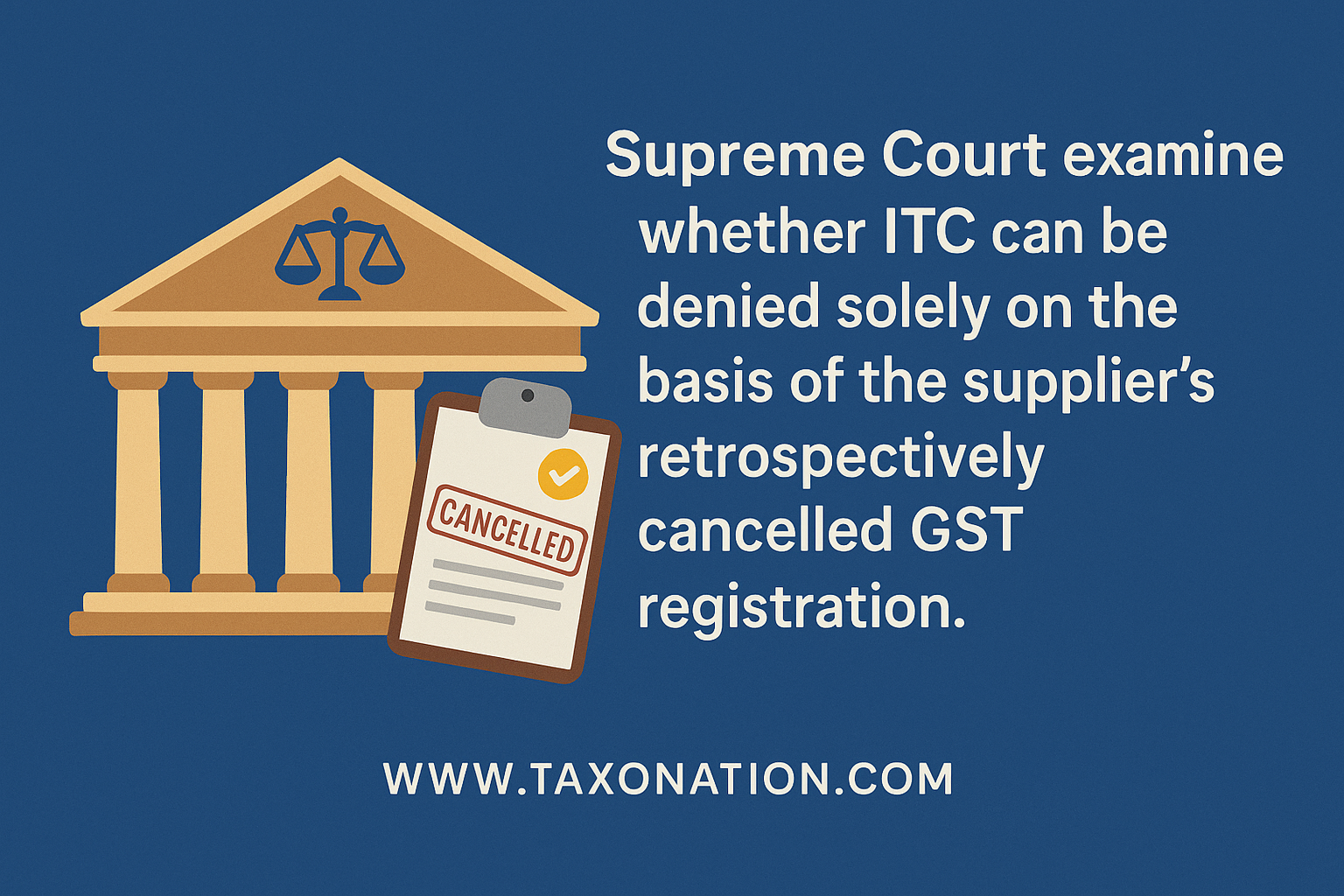
Facts of the Case
The petitioners in these matters faced substantial GST demands following adjudication orders issued under the CGST/WBGST Acts. The authorities alleged that the petitioners claimed ITC from suppliers whose GST registrations were later cancelled—sometimes retrospectively—and relied heavily on statements of suppliers and transporters.
In one matter M. A. T. 854 of 2024 [2024 TAXONATION 952 (CALCUTTA)], an adjudication order dated 1 February 2024 affirmed a tax demand of Rs 2.82 crore, along with interest and penalty. The petitioner argued that:
Statements of the supplier and transporter relied upon by the department were never furnished.
Requests for cross-examination were ignored.
The selling dealer’s registration was valid on the date of purchases, even though later cancelled with retrospective effect.
E-way bills proved movement of goods and should not be dismissed as fake.
In another connected matter M. A. T. 1212 of 2025 [2025 TAXONATION 2330 (CALCUTTA)], the adjudicating authority had previously been directed to conduct de novo adjudication, but after passing a fresh order on 24 July 2024, the petitioner again challenged the outcome. They claimed:
They had produced all documents available to prove movement of goods.
Fastag Portal details—crucial for demonstrating vehicle movement—were inaccessible to them and should have been accessed by the department.
Statements made during cross-examination were not properly considered.
Across both cases, the High Court noted that the petitioners had an effective alternate remedy through statutory appeal, requiring a pre-deposit of 10% of disputed tax.
Meanwhile, in the matter before the Supreme Court, the High Court had refused relief solely because an alternate remedy existed. The petitioner contended before the Supreme Court that:
ITC cannot be denied merely because the seller’s GST registration was cancelled.
Purchases were genuine, and cancellation of the supplier’s registration should not penalize the buyer.
Issues Involved
The combined set of proceedings raised the following key issues:
Whether ITC can be denied if the supplier’s GST registration is cancelled, even retrospectively.
Whether the burden of proving movement of goods lies solely on the buyer.
Petitioner’s Arguments
Across the matters, petitioners collectively argued that:
The department acted arbitrarily by relying on statements of suppliers and transporters without furnishing copies or granting cross-examination.
Retrospective cancellation of the supplier’s registration cannot render genuine transactions invalid.
E-way bills and invoices were statutory documents proving transportation of goods.
Fastag movement data was beyond their control and the department should provide assistance.
ITC claimed was based on genuine purchases and should not be denied merely due to subsequent cancellation of supplier registration.
The High Court should intervene because violations of natural justice cannot be remedied in appeal.
Respondent’s Arguments
The tax authorities argued that:
The petitioners had an alternative efficacious remedy of filing a statutory appeal with 10% pre-deposit.
The burden of proving movement of goods lies on the purchaser as per Section 16.
Statements of suppliers and transporters indicated that transactions were suspicious or non-genuine.
Fastag data could be accessed during appellate proceedings.
High Court should not interfere when disputed facts require detailed examination.
Court Order
High Court Findings
Across both High Court matters:
In one case M. A. T. 854 of 2024 [2024 TAXONATION 952 (CALCUTTA)], the Court held that non-supply of statements and denial of cross-examination constituted violation of natural justice.
The adjudication order was set aside and the matter was remanded with directions to:
Provide copies of statements,
Permit cross-examination,
Complete fresh adjudication within 60 days.
In the other case M. A. T. 1212 of 2025 [2025 TAXONATION 2330 (CALCUTTA)], the High Court refused interference because a statutory appeal was available.The petitioner was directed to file an appeal within 60 days, which would be entertained without limitation bar.The appellate authority was directed to:
Consider all documents,
Access Fastag data if requested,
Grant personal hearing,
Pass a reasoned order.
Supreme Court Proceedings
The Supreme Court:
Noted that the High Court refused relief due to the existence of an alternate remedy.
Recorded the petitioner’s argument that ITC was denied solely due to cancellation of the seller’s GST registration.
Did NOT decide this issue.
Issued notice, returnable on 8 December 2025.
Directed service of paper books to the counsel for the State of West Bengal.
Important Clarification
The Supreme Court has not given any ruling on whether ITC can or cannot be denied due to supplier’s cancelled registration.It has merely acknowledged the petitioner’s argument and sought a response from the State.
GST Case Law Roshan Sharma Versus Deputy Commissioner of Revenue
Citation-2025 TAXONATION 2852 (SUPREME COURT)(Click here to read full case law)
SUBSCRIBE GST E-LIBRARY (INDIA'S HIGHEST GST CASE LAW DATA)
FOR MORE UPDATE ON GST/ IT JOIN OUR FREE WHATSAPP GROUP BY CLICKING ON THIS LINK https://chat.whatsapp.com/C8VB6F6VHme3A061UDQKhj
Comment: